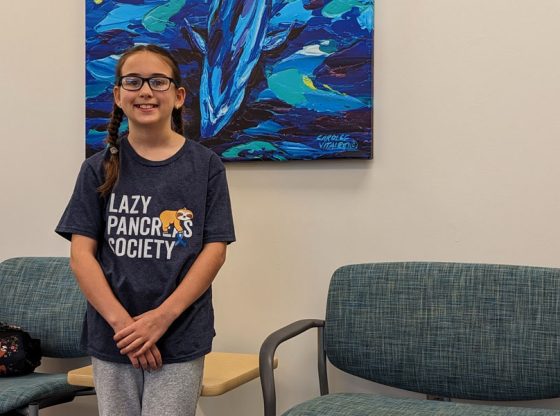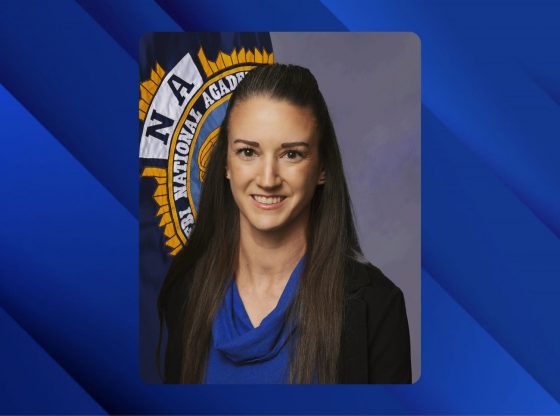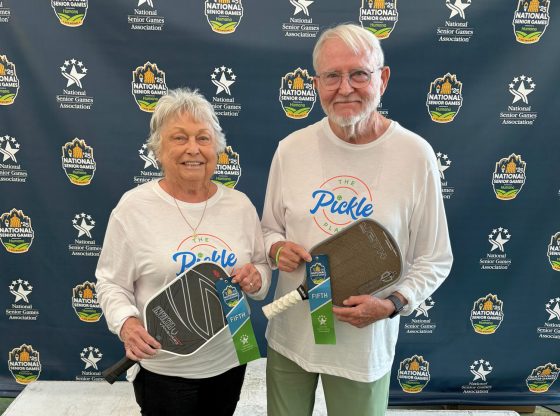Katie Moffat was all smiles and eager to talk about her love of reading and Type 1 diabetes.
“I read everything. But I don’t read horror because it horrifies me,” Katie said with her fingers spread wide. “I like books about animals, people, sci-fi, and realistic fiction, and right now, I’m reading three at once.”
“I’m reading ‘The War that Saved My Life,’ about a crippled girl, and it is real life. Hitler was bombing, and it saved her life because her mom was abusive to her.”
Katie is a fifth grader at Pinehurst Elementary School and is a great student. She said her favorite subjects are science and math.
Jenny Moffat, Katie’s mother, teaches STEM at the same school and helps dose and monitor her daughter’s diabetes.
“I have robot parts,” Katie said as she raised her sleeves to reveal colorful devices attached to each upper arm.
Katie Moffat describes a day of her life with Type 1 diabetes on March 16, 2023, at Pinehurst Elementary School.
“It’s a closed loop, an artificial pancreas, so it takes Dad and I out of the loop, so we don’t have to shut it down,” Jenny said about the newest device and dosing her daughter with insulin.
Katie was the first child to receive a new medicine. It is the first disease-modifying medication device for Type 1 diabetes and was cleared by the Food and Drug Administration in November 2022. It delays the onset of symptoms for three to five years.
“She was diagnosed, really sick, when they were starting clinical trials, but COVID-19 shut down trials, and the drugs she was on could have interfered, so she was the first and youngest. Went through forty days after diagnosis. It puts armor around the remaining beta cells, and she stayed in the hospital fourteen days. I went home at night, but was ten minutes away,” Jenny said about her daughter’s experience at the University of North Carolina’s Medical Center (UNCMC) at Chapel Hill when she stayed nearby instead of at home in Moore County.
Jenny said that after other parents saw her daughter was OK, they did it too.
“I can swim. I go horseback riding at Prancing Horse, and I love art, everything art!” said Katie, who was so excited she could not sit still.
The “robot parts” tell Katie, her family, and school staff when to read her insulin levels and when to dose.
“I can make the whole cafeteria and classroom go quiet when I beep,” Katie said. “Beeps tell me if I am high or low. I beep at night. I sleep through most beeps until Mom checks and sees if I need a juice box, a fruit squeeze, or icing on my gums, glucose or tabs.”
Katie said her favorite animal is the sloth because when she was transported on the verge of a diabetic coma to UNCMC, there was an angel on her bed, a stuffed sloth.
“I was too tired to stay awake, and it saved my life,” Katie said.
“A sloth was on her bed waiting for her, like a spirit animal,” Jenny added.
The two agreed that it was ironic that before the Type 1 diabetes diagnosis, Katie’s biggest fear was needles, and now she helps nurses with blood draws. Before the insulin pump, she received up to eight shots each day.
The “robot parts” each work with a phone, which is not a phone, but monitors.
“Once, a phone was stolen and dumped, and we found it. It is a lifesaving phone,” Jenny said about a thief realizing the phone was not programmed for phone uses like calls or the internet.
When glucagon is administered, a call to 911 is made because Katie is usually unconscious once glucose reserves are gone, and she is sent to the hospital.
According to the Cleveland Clinic, glucagon is a hormone made in the pancreas that prevents blood sugar from dropping too low. And glucose is the main sugar in blood. Glucose is from carbohydrates in food. This sugar is an important source of energy and provides nutrients to your body’s organs, muscles, and nervous system, and is crucial for the brain.
Jenny said her daughter is the only person in the family with Type 1 diabetes.
Prior to Katie’s diagnosis, her brother, Aiden, in eighth grade, was on life support for two weeks for an autoimmune disorder. He had post-streptococcal glomerulonephritis, a kidney disorder.
The family attends Faithful Bible Church, which meets at Aberdeen Elementary School.
Feature photo: Katie Moffat is excited to talk about her life as a fifth grader on March 16, 2023, at Pinehurst Elementary School.
~Article, photo, and video by Sandhills Sentinel Journalist Stephanie M. Sellers. Contact her at [email protected]




















Comments
Comments are closed.